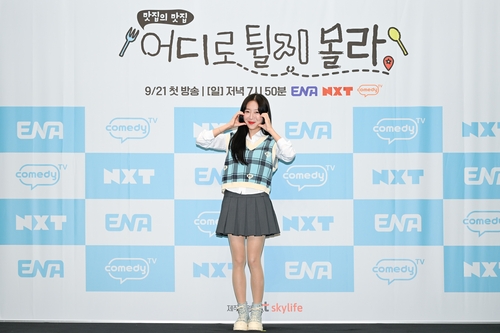After long hesitation, Tzuyang agreed to join a variety show as a regular cast member.
Her introverted nature and commitment to her YouTube channel made the decision difficult.
Past controversies over undisclosed sponsorships and a forced retirement episode also shaped her choice.
This new step reflects both personal recovery and shifting boundaries between online creators and traditional media.
Tzuyang on Studio Ground: A Quiet Record of Risk
The Moment of Choice
The decision did not come easily.
Tzuyang often describes herself as "not especially funny or outgoing."
However, repeated meetings with producers turned the offer from a single invite into a real chance for change.
She weighed how to translate the trust she built on YouTube into mainstream television.

She did not rule out television entirely.
Rather, she insisted on keeping her own pace.
So she examined contract terms and the program’s tone before agreeing.
That cautious process highlights how creators set personal boundaries and manage themselves inside a media system.
Undisclosed Sponsorships and Forced Retirement
The episode was painful.
In 2020, allegations about undisclosed sponsorships surfaced and led to her temporary retirement announcement.
Tzuyang later claimed she had been coerced by an ex-partner who threatened to release secret recordings and pressured her into certain actions.
Those claims raised questions beyond ad ethics—about personal safety and rights.
The later claim that threats from an ex-partner forced her actions cast the controversy in a new light.
This case shows how "ethics" and "rights" can clash in the creator economy.
Transparency in sponsorships is a trust issue for platforms and audiences alike.
Meanwhile, it also reveals structural vulnerabilities: female creators can be exposed to external pressure in ways that undermine their autonomy.
The forced retirement and difficult return left deep marks on her mental health and professional identity.
Challenge as Growth
This is a new path.
Supporters view her TV debut as personal growth and media expansion.
They argue that the creative skills and fan base she built on YouTube can translate into a meaningful presence on broadcast television.
Moreover, appearing on a regular show offers a direct channel to engage with a broader audience.
Platform expansion helps creators diversify their careers.
Concretely, her mukbang (eating show) format draws viewers in the studio as well as online.
Producers planned her role as a regular cast member, not just a guest, which can stabilize and extend her brand.
Also, television’s editing and direction could give her content a new rhythm and polish.
In the era of convergent media, moving between platforms is a survival and growth strategy for creators.
For example, other YouTubers turned TV personalities have successfully reshaped their public image.
They gained new roles, expanded sponsorship deals, and diversified income.
Tzuyang may benefit from those same dynamics while managing fan expectations.
She can test new forms of expression on a larger stage while keeping the trust of her audience.
Practical Concerns Are Real
Worries are serious.
Critics fear that regular TV work could cause excessive stress.
She is naturally private and introverted, and prior experiences left trauma from outside pressure.
So studio life and continuous exposure risk amplifying mental strain.
Many voices have flagged concerns about her privacy and wellbeing.
Also, the undisclosed-sponsorship controversy is not completely closed.
If sponsorships and product placements are not clearly revealed, trust can erode again.
Traditional TV schedules and editorial choices may override a creator’s preferences and pace.
When audience expectations clash with production demands, backlash becomes likely.
Looking at other examples, some creators lost balance between TV schedules and fan expectations and suffered reputation damage.
They experienced burnout from overexposure and ultimately stepped back from public life.
To avoid repeating such patterns, systematic protections and sensitive production practices are necessary.
In short, expansion should not be pursued without safety and health safeguards.
Conditions for Balance
Transparency is essential.
A neutral view recognizes both advantages and risks in her move to TV.
Above all, systems that ensure ethical sponsorship disclosure and personal safety must be in place.
From the production side, clear sponsor disclosure and mental-health support should be defined from the start.
Institutional safeguards also matter.
Platforms and broadcasters should collaborate on sponsorship standards and guidelines that protect creators’ rights.
In that process, Tzuyang should be treated as a content creator with creative agency—not merely as a TV performer.
Mature media ecosystems demand both individual protection and ethical accountability.

Only when these conditions are met will her television move become sustainable.
It must grow into a public conversation, not just temporary curiosity.
That requires shared responsibility from fans, producers, and platforms.
Otherwise, the risk of repeated personal harm remains high.
Conclusion and Recommendations
Tzuyang’s choice is both a personal decision and a public challenge.
This appearance is not simply a shift in platform; it asks questions about rights and ethics.
True success will depend on respecting her pace and boundaries.
Producers and platforms should prioritize transparency and protective measures.
In practical terms, this column makes several suggestions.
First, establish clear rules for disclosing ads and sponsorships.
Second, standardize contract clauses that protect mental health and private life.
Third, provide pre-show briefings to manage fan expectations and reduce misunderstandings.
These steps would create safeguards for Tzuyang and for creators more broadly.
Finally, a question to readers:
How do you view Tzuyang’s move to television?
Should media expansion or personal protection take priority?